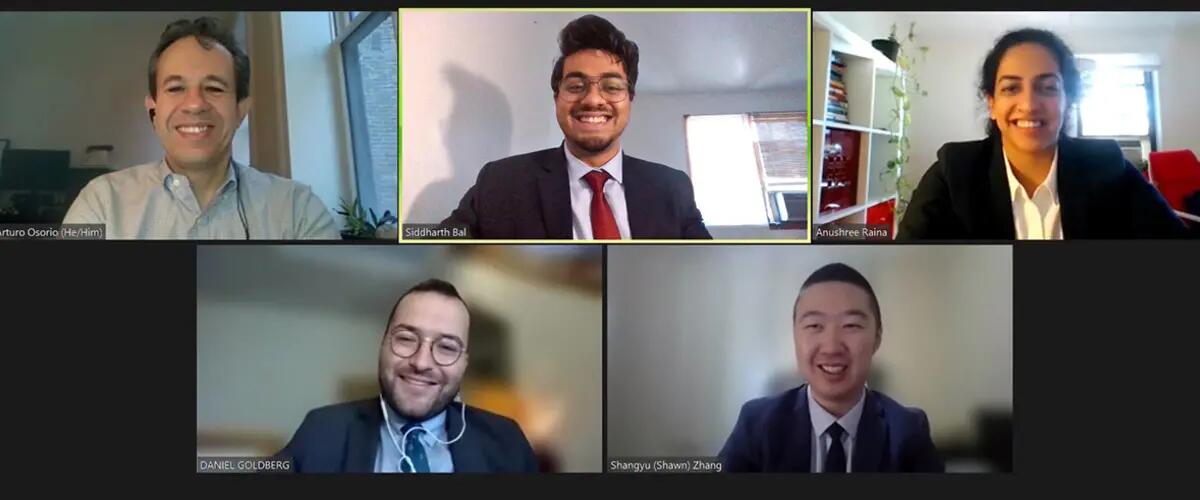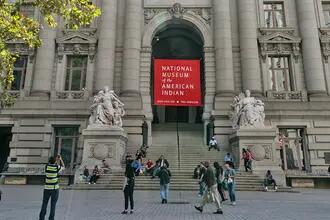
Siddharth Bal, top row, center, and his MBA teammates. Professor Arturo Osorio Fernandez, top row, left, coached the students.
On this international MBA student's To-Do list: Case competitions
As mentioned in my earlier blog, the bootcamps, case studies, networking events and team bonding activities are a small part of the two-year Rutgers MBA program. Yet each one of those things plays a crucial role in shaping our career by giving us a glimpse of the business world.
Case competitions are another.
At Rutgers, MBA students can participate in numerous case competitions throughout the year which are hosted by various business schools across the United States. A case competition requires us to come up with a solution to a real-world business problem. The problem can be related to an issue faced by the management of a company or the launch of a new business or the revamp of an existing one.
In November, three of my classmates and I participated in a case competition which was conducted by Katz Business School. It was virtual with more than 15 schools participating, and we were given two weeks to prepare our presentations. The case study was very interesting and was intended to sensitize us to the technical and non-technical aspects of business. It required that we understand the importance of DEI (Diversity, Equity and Inclusion) within an organization and use that learning to propose ideas that would help the organization grow its business volume through its DEI initiatives. Rutgers is known for its emphasis on diversity, equity and inclusion which is evident as 30% of the Full-Time MBA cohort comprises of international students, so it was no surprise that our team represented more than four nationalities. Our team comprised of Daniel Goldberg, Shawn Zang, Anushree Raina and myself. All of us had experience working in different industries and living in different countries, so we were able to bring diverse ideas to the table. Moreover, we were also provided with a mentor from the Rutgers faculty, Professor Arturo Osorio, who served as a lifeline for our team. As this was our first case competition, he helped us navigate through the case and find the critical points which would have gone unnoticed otherwise. This case competition was a replica of the team projects and cases that we discussed within our classroom in terms of the framework and structure. So, this was the perfect opportunity for us to apply our learning and experience.
Over two weeks, we spent our time doing research on the company and the community around it to implement ideas which would empower the company through DEI initiatives. We proposed such things as restructuring the organization hierarchy to increase diversity within the organization, partnering with Employment Resource Groups (ERGs) to hire diverse talented individuals, and diversifying suppliers to create a more resilient supply chain. Having a mentor to guide us definitely helped us think of solutions out of the box. Though we did not win the case competition, the overall experience was truly enriching. We even received a special mention from the judges panel about being one of the most comprehensive groups with our solutions, financials and overarching plans.
Through our internal discussions and constant revamping of our presentation deck, we realized we had learned a great deal about the various verticals within an organization and how it can be restructured to optimize productivity.
It was our first case competition, but it won’t be our last. Some of our classmates recently participated in the prestigious Tepper Case Competition and the Florida Southern Case Competition, and both teams secured first place. Those wins will motivate all of us to strive harder to reach our potential for other upcoming competitions. As for me, I’m planning to participate in the Texas Christian University competition next semester.
Siddharth Bal is an MBA student from India. His blogs describe the experiences of an international student attending Rutgers Business School. If you missed his previous blogs, see them here:
Press: For all media inquiries see our Media Kit


